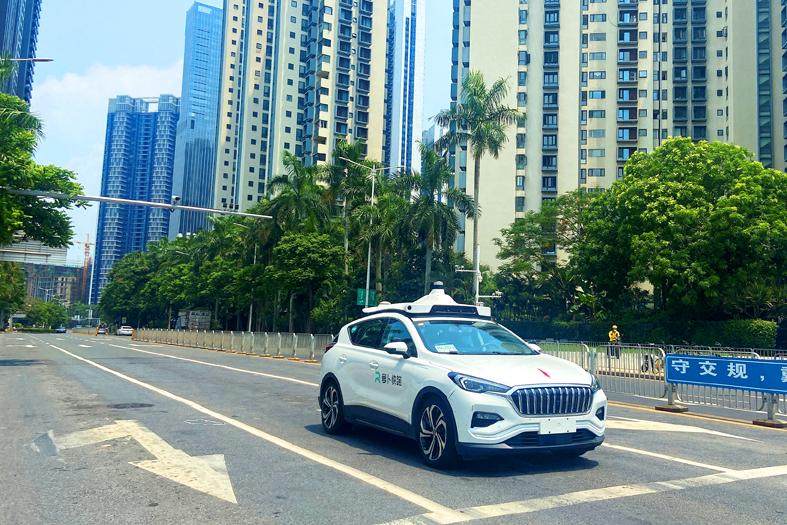Baidu Inc (百度) has won approval to deploy the first fully autonomous self-driving taxis on China’s roads, giving it an edge over rivals such as Pony.ai Inc (小馬智行) and XPeng Inc (小鵬汽車).
The tech giant has secured permits to operate robotaxis in Wuhan and Chongqing, it said in a statement yesterday.
The move marks a relaxation of Chinese rules, which previously mandated someone must be in the vehicle to take control in case of an emergency.

Photo: Reuters
Baidu is to begin to provide fully driverless robotaxi services in designated areas in Wuhan between 9am to 5pm, and Chongqing from 9:30am to 4:30pm, with five Apollo fifth-generation robotaxis operating in each city. The service area covers 13km2 in the Wuhan Economic & Technological Development Zone, and 30km2 in Chongqing’s Yongchuan District.
Baidu is working with regulators in Beijing and Guangzhou to obtain similar permits, Baidu Intelligence Driving Group vice president Wei Dong (魏東) said.
“It’s as if we’ve landed on the moon and built a base there,” he said in a video interview. “It’s just a matter of time for us to go to Mars or even beyond our solar system.”
In the US, Cruise LLC in June won a license to charge for fully driverless rides in selected areas in San Francisco, but the General Motors Co-backed start-up is now facing regulatory scrutiny after two on-road incidents, including an accident that left two people with minor injuries.
In China, Baidu and self-driving start-up Pony.ai earlier this year received approval from local regulators to deploy vehicles without someone in the driver’s seat in part of Beijing.
Baidu, which operated China’s largest search engine, is transitioning to artificial intelligence and self-driving vehicles after its core advertising revenue shrank in the mobile era.
Its smart-driving business provides software to automakers such as Geely Automobile Holdings Ltd (吉利汽車) and runs a ride-hailing app powered by a fleet of self-driving vehicles in major cities, including Beijing and Shanghai.
Baidu last month unveiled a new version of its robotaxi, called the Apollo RT6, that it sad costs nearly 50 percent less to make than its previous model.
The company plans to double the number of robotaxis it has on Chinese roads to 600 by the end of this year, Wei said.

Semiconductor shares in China surged yesterday after Reuters reported the US had ordered chipmaking giant Taiwan Semiconductor Manufacturing Co (TSMC, 台積電) to halt shipments of advanced chips to Chinese customers, which investors believe could accelerate Beijing’s self-reliance efforts. TSMC yesterday started to suspend shipments of certain sophisticated chips to some Chinese clients after receiving a letter from the US Department of Commerce imposing export restrictions on those products, Reuters reported on Sunday, citing an unnamed source. The US imposed export restrictions on TSMC’s 7-nanometer or more advanced designs, Reuters reported. Investors figured that would encourage authorities to support China’s industry and bought shares

FLEXIBLE: Taiwan can develop its own ground station equipment, and has highly competitive manufacturers and suppliers with diversified production, the MOEA said The Ministry of Economic Affairs (MOEA) yesterday disputed reports that suppliers to US-based Space Exploration Technologies Corp (SpaceX) had been asked to move production out of Taiwan. Reuters had reported on Tuesday last week that Elon Musk-owned SpaceX had asked their manufacturers to produce outside of Taiwan given geopolitical risks and that at least one Taiwanese supplier had been pushed to relocate production to Vietnam. SpaceX’s requests place a renewed focus on the contentious relationship Musk has had with Taiwan, especially after he said last year that Taiwan is an “integral part” of China, sparking sharp criticism from Taiwanese authorities. The ministry said

CHANGING JAPAN: Nvidia-powered AI services over cellular networks ‘will result in an artificial intelligence grid that runs across Japan,’ Nvidia’s Jensen Huang said Softbank Group Corp would be the first to build a supercomputer with chips using Nvidia Corp’s new Blackwell design, a demonstration of the Japanese company’s ambitions to catch up on artificial intelligence (AI). The group’s telecom unit, Softbank Corp, plans to build Japan’s most powerful AI supercomputer to support local services, it said. That computer would be based on Nvidia’s DGX B200 product, which combines computer processors with so-called AI accelerator chips. A follow-up effort will feature Grace Blackwell, a more advanced version, the company said. The announcement indicates that Softbank Group, which until early 2019 owned 4.9 percent of Nvidia, has secured a

CARBON REDUCTION: ‘As a global leader in semiconductor manufacturing, we recognize our mission in environmental protection,’ TSMC executive Y.P. Chyn said Taiwan Semiconductor Manufacturing Co (TSMC, 台積電), the world’s biggest contract chipmaker, yesterday launched its first zero-waste center in Taichung to repurpose major manufacturing waste, which translates into savings of NT$1.5 billion (US$46 million) in environmental costs a year. The environmental cost savings include a carbon reduction benefit of 40,000 tonnes, equivalent to the carbon offset of over 110 Daan Forest Parks, the chipmaker said. The Taichung Zero Waste Manufacturing Center is part of the chipmaker’s greater efforts to reach its net zero emissions goal in 2050, aligning with the UN’s 12th Sustainable Development Goal. The center could reduce TSMC’s outsourced waste processing